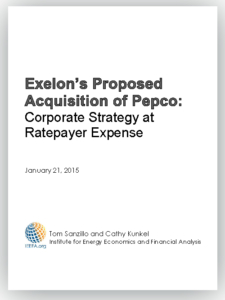Corporate Strategy at D.C. Ratepayer Expense: Exelon’s Proposed Acquisition of Pepco Holdings
 We’re releasing a new report today that explains how Exelon Corp.’s proposed $6.8 billion acquisition of Pepco Holdings would hurt ratepayers in Washington, D.C.
We’re releasing a new report today that explains how Exelon Corp.’s proposed $6.8 billion acquisition of Pepco Holdings would hurt ratepayers in Washington, D.C.
Our report, “Exelon’s Proposed Acquisition of Pepco: Corporate Strategy at Ratepayer Expense,” is posted here.
Here’s a snapshot:
- The deal, if it goes through, would expose customers to rate increases aimed at supporting Exelon’s struggling business model;
- it would undermine the District of Columbia’s renewable-energy initiatives;
- and it would expose ratepayers to long-term risks that are significantly larger than the short-term protections and public benefits claimed by Exelon.
Exelon is the largest owner of nuclear power plants in the country, and its aging nuclear fleet has been challenged in recent years by low wholesale power prices that are driven by cheap natural gas, stagnant electricity demand, and increasing renewable energy and energy efficiency.
Like other large utility holding companies with struggling deregulated-generation subsidiaries (e.g. FirstEnergy, AEP, Duke and PPL), Exelon is responding to the new energy landscape by growing the regulated side of its business—where earnings are more stable because investments are recovered through rates approved by public service commissions. Exelon is investing more in its existing regulated subsidiaries, a strategy that leads to higher rates. Exelon’s impact has been painfully apparent in its acquisition of Baltimore Gas & Electric in 2012, where it has sought four increases since then. Now Exelon sees opportunity in owning Pepco’s three regulated distribution companies.
The high price that Exelon proposes to pay for Pepco—$2.5 billion more than the net book value of Pepco’s assets—will put pressure on Exelon to extract as much value as possible from the acquisition. This increases the risk of rate increases for Pepco customers and stems from Pepco’s ownership interest in nuclear generation. Exelon has a fiduciary duty to its shareholders to ensure and enhance the profitability of these assets. Its interest in doing so does not necessarily align with the interests of D.C. electric customers, either in terms of rates or in terms of policy.
The District of Columbia has ambitious renewable energy goals, yet Exelon has a track record of opposition to renewable energy policy. Nowhere in its testimony for its acquisition proposal has the company shown support for the district’s renewable energy goals.
Our report finds also that the acquisition would make it more difficult for the District of Columbia Public Service Commission to effectively regulate Pepco. Exelon—whose headquarters are almost 700 miles away—isn’t likely to have much interest in pleasing D.C. regulators. Pepco would be only a portion of its business. And although Exelon has promised that Pepco would maintain an “arms-length” relationship with all of its affiliates, financial pressures on Exelon to perform well will create an incentive to make riskier affiliate transactions whose costs would ultimately be passed on to ratepayers. Our report provides several examples of past utility-company mergers that have resulted in more difficulties for regulators because the new corporate parent was less willing than the acquired company was to follow commission precedent and more resistant to taking direction from state commissions.
A merger like this would not have been possible a decade ago. The Public Utility Holding Company Act of 1935 placed restrictions on utility holding companies in order to protect ratepayers against the holding-company excesses that contributed to the Great Depression. That law restricted affiliate transactions, for instance, and it limited a regulated utility’s ability to acquire other utilities that did not have adjacent service territories or to acquire non-utility businesses. PUHCA was rolled back in 1992 and then repealed by the Energy Policy Act of 2005, opening the door to all sorts of questionable new merger possibilities like the proposed Exelon-Pepco merger.
That’s why state regulators—and D.C. regulators—have a greater responsibility than ever to ensure that relatively novel utility combinations like this proposed merger are in the public interest. In this case, the short-term benefits promised by Exelon do not mitigate the long-term risks to ratepayers. We recommend that the proposal be rejected.
Cathy Kunkel is an IEEFA fellow.














